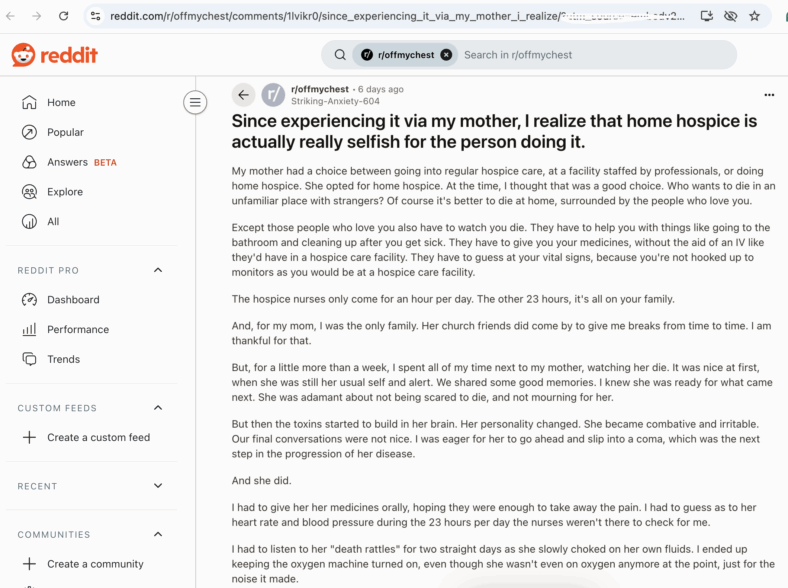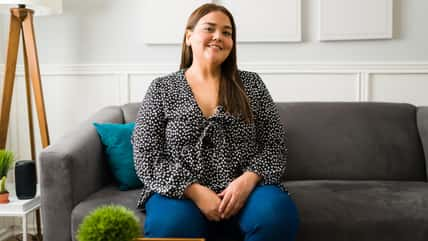She Put Her Mom On Hospice And Feels It’s Actually A Selfish Decision After Watching What She Went Through

Many people don’t get the opportunity to choose how they’d prefer to die. The moment comes suddenly, sometimes unexpectedly, and leaves loved ones wishing for more time or autonomy over the situation.
But for sick or aging people (and their families), the ability to pick where you’ll take your last breath is also taxing. And when they choose home hospice, it’s perhaps even more difficult than a quick death.
At least, that’s the way this woman feels about her own experience with her late mother. Her sick mom was ultimately given a choice between living out the rest of her final days in a regular hospice care facility that’s staffed by professionals or remaining in her home via “home hospice.”
At the time, her mom opted for the latter, and she actually believed that was the right choice.
“Who wants to die in an unfamiliar place with strangers? Of course, it’s better to die at home, surrounded by the people who love you,” she thought.
However, that was until she realized that the people who care about home hospice patients have to become caregivers themselves, and she’s since come to believe the process is selfish.
She had to assist her mom with going to the bathroom, clean up after she got sick, provide her mom’s medications without the help of an IV, and guess what her mom’s vital signs were because they didn’t have any monitors.
Her mother was only visited by a hospice nurse for one hour each day. The rest of the 23 hours were all on her, as she’s her mother’s only family.
Thankfully, her mother’s friends from church stopped by from time to time to give her a break, and she was grateful for that. Still, the most agonizing part of the whole experience? Having to sit by and watch her mother slowly die.

Sign up for Chip Chick’s newsletter and get stories like this delivered to your inbox.
“For a little more than a week, I spent all of my time next to my mother, watching her die,” she recalled.
“It was nice at first, when she was still her usual self and alert. We shared some good memories. I knew she was ready for what was to come next. She was adamant about not being scared to die and not mourning for her.”
Then, things changed. Brain toxins began to build up, and her mom’s personality shifted. Suddenly, her mom became irritable and combative, and their last conversations were not very pleasant.
This left her yearning for when her mom would slip into a coma, marking the next step in the progression of her disease. Eventually, she did, but even that brought another level of emotional hardship.
She was forced to provide her mom’s medications orally and hope that they were enough to ease her pain. She also had to just guess what her mom’s blood pressure and heart rate were whenever the hospice nurses were not there.
“I had to listen to her ‘death rattles’ for two straight days as she slowly choked on her own fluids,” she added.
“I ended up keeping the oxygen machine turned on, even though she wasn’t even on oxygen anymore at that point, just for the noise it made.”
She was holding her mom’s hand when her mom finally passed away, and she was thankful for that. Nonetheless, she was forced to call the hospice workers right after to alert them of her mom’s death, and it took them nearly an hour to arrive at her house.
It was understandably tough for her to be alone with the deceased body of her mother for so long, which is why she went outside, sat on the porch, and waited there for the hospice workers to arrive.
As she reflects on those last days, she’s glad that her mom was able to transition at home, where she wanted to, and that she was there for her. In the future, though, she refuses to put her own kids through the same experience.
“When they tell me I need hospice, I will do it in a facility. If my family wants to visit me, great. But I don’t want them to have to stay at my side for days on end, watching me die,” she concluded.
Do you think the comfort of the person dying should be balanced against the emotional hardship of their family when choosing home hospice? Would you be able to provide such care for your own loved ones?
You can read the original post below.


More About:Relationships





